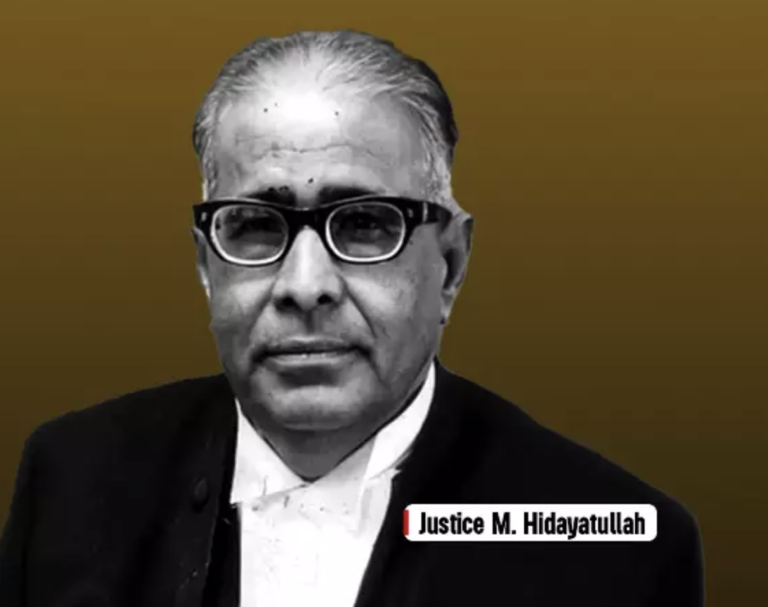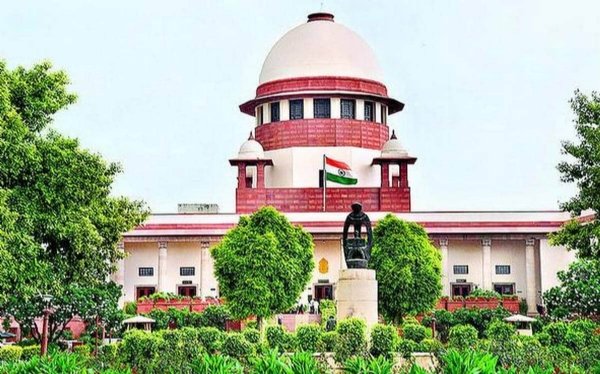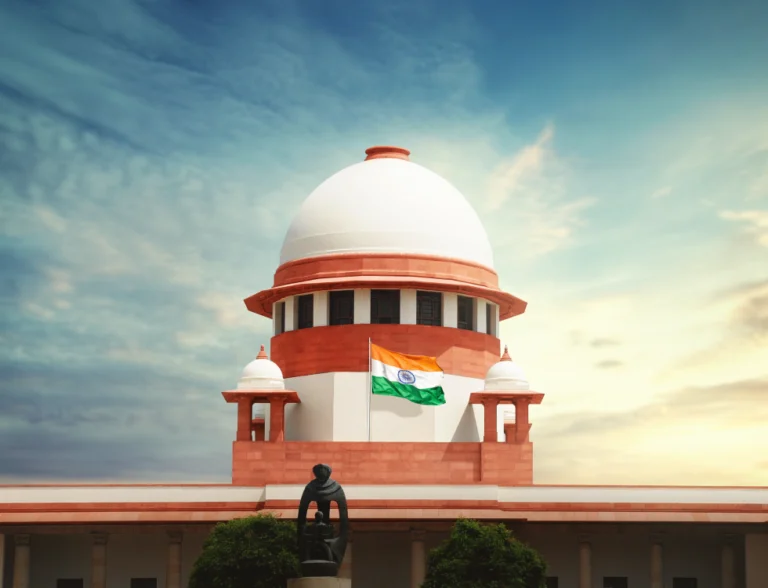[Big Breaking] SCLA filed a case before Hon’ble President of India against the former Chief Justice of India Sh. J. S. Khehar, Justice Arijit Pasayat and two more judges of the Supreme Court U/s 220, 218, 219, 166, 409, 120(B), 34 etc of IPC for unlawful detention of Mr. Subrato Roy Sahara, and Zahira Shaikh beyond the maximum punishment provided in Contempt of Courts Act. [Case No. before Hon’ble President of India PRSEC/E/2023/0014606]

Justices (retd.) H.K. Sema and K.S. Radhakrishnan are co accused. Similar cases are already filed against Justices (retd.) R.F. Nariman, Deepak Gupta and others in other cases of misuse of Supreme Court machinery for their personal and ulterior purposes.
The judges are accused of offences under sections 220, 218, 219, 166, 409, 120(B), 34 etc of IPC of the Indian Penal Code for illegal cognizance, prosecution conviction/ detention of the victim in judicial custody in contravention of the Contempt of Courts Act,1971 and in wilful disregard of the binding precedents of the Supreme Court.
Justices (retd.) R.F. Nariman, Deepak Gupta are accused of forgery, perjury and destroying Supreme Court records and suppress the orders of the then CJI and falsely mentioning in the order that CJI had asked Justice (retd.) R.F. Nariman to take cognizance of the contempt in his own case. However the reply given by the office of CJI had ex facie proved that CJI had already closed the case and never forwarded it to Justice (retd.) R.F. Nariman. Whole perjury and forgery was done with only intention to save Justices (retd.) R.F. Nariman and Sh Vineet Saran.
President of the Supreme Court Lawyers Association Adv. Ishwarlal Agarwal had filed the case.
Petitioner’s Adv. Nilesh Ojha said that the orders of above said Supreme Court Judges are in violation of Article 20 (1) of the Constitution of India as well as Article 15 of the International Covenant on Civil and Political Rights (ICCPR).
Indian Bar Association and many Human rights Activists organizations across the country have extended their support for initiating prosecution against such criminal minded Judges.
It is important to note that Chief Minister of Sikkim late Sh. Kalikho Pul in his suicide note had said that Justice J. S. Khehar through his son had demanded Rs. 77 Crore for passing an order in his favor in a case pending in the Supreme Court before Justice Khehar. Other Judges of the Supreme Court are also named in the said suicide note These allegations were not seem to denied by the Judges named in the suicide note.
If prosecuted and punished, then Justices (retd.) J. S. Khehar , Arijit Prasayat, H.K. Sema and K.S. Radhakrishnan R.F. Nariman, Deepak Gupta may face life imprisonment under section 409 of the IPC and 7 years of imprisonment under section 220 of the IPC.
New Delhi: The issue involved in these cases is that there is a specific provision and procedure under Contempt of Courts Act, 1971 for dealing with the cases under Contempt of Supreme Court and its validity is upheld by the Constitution benches of the Supreme Court . Then also some Judges are acting arbitrarily and passing orders against the provisions of the Act and also against the binding precedents of larger benches. By misusing the powers some Judges have prosecuted, convicted, punished/detained common man, woman, lawyers, IPS and Police officials, Human Right Activists, father, husband etc. Many of them are detained for one or two years imprisonment when the maximum punishment for contempt is six months imprisonment and sec 13 of the contempt of Courts Act had prohibited many categories where neither cognizance should be taken of contempt nor punishment should not be given.
It is a clear case of violation of Art. 21, 20(1) of the Constitution of India. Such convictions and detention are illegal. Article 20 (1) of the Constitution of India & Article 15 (1) of the ICCPR and Sec 436 A of Cr. P. C. guarantees every citizen that they will not be punished or detained for a period more than what is provided in the law made by the legislature. It makes the state/accused Judges liable for paying compensations to the victim. Because of it the image, majesty and dignity of the Supreme Court is being lowered down and brought into disrepute.
Another grievance of the Bar Associations is that as per the Article. 14 (5) of the International Covenant on Civil and Political Rights (ICCPR), every person convicted by the Supreme Court under its original jurisdiction is entitled for one appeal before higher tribunal and said protection under ICCPR is available to every Indian citizen as ruled by Nine Judge bench in K.S. Puttaswamy (Privacy-9J.) v. Union of India, (2017) 10 SCC 1.
A 17-Judge Bench of United Nations Human Rights Committee comprising Justice P.N. Bhagwati in the case of Anthony Michael Emmanuel Fernando v. Sri Lanka, 2005 SCC OnLine HRC 22 had strongly condemned the conviction of imprisonment in contempt by the Chief justice of the Supreme Court of Srilanka and declared it to be arbitrary, draconian and inappropriate and violative of Art. 9 of ICCPR. The committee in many such cases had directed the State authority to pay compensation to the citizen and provide them an appellate jurisdiction against the conviction by the Supreme Court in its original jurisdiction.
The other landmark judgments by United Nations Human Rights Committee is Luis Hens Serena v. Spain, 2008 SCC OnLine HRC 20 .
ADDITIONAL INFORMATION
1. That the Constitution benches of the Supreme Court had made it clear that the contempt proceedings before the Supreme Court has to be conducted as per the provisions of Contempt of Courts Act, 1971. The Article. 129 & 142 of the Constitution just gives power to the Supreme Court and the limit of punishment is prescribed in Section. 12 of the Contempt of Courts, 1971 [Maheshwar Peri Vs. High Court of Judicature at Allahabad (2016) 14 SCC 251,Pallav Sheth v. Custodian, (2001) 5 SCC 763(3J), Baradakanta Mishra v. Registrar of Orissa High Court, (1974) 1 SCC 374 (5-J), Arundhati Roy, In re, (2002) 3 SCC 343, C.S. Karnan, In re, (2017) 7 SCC 1(7-J),]
2. The maximum punishment provided under section 12 of the Contempt of Courts Act, 1971 is six months imprisonment and a fine of ₹2,000/-. However few Judges of the Supreme Court have acted against the law and imposed sentence beyond the maximum punishment. The two examples are given below.
2.1. In Zahira Shaikh Vs State (2005) 4 SCC 294 , Justice Arijit Prasayat & Justice H. K. Sema sentenced Zahira Shaikh to 1 year imprisonment and a fine of ₹50,000/-.
2.2. In SEBI v. Sahara India Real Estate Corpn. Ltd., (2014) 5 SCC 429, Bench of Justice J. S. Khehar & Justice K. S. Radhakrishnan detained Mr. Subrato Roy Sahara an indefinite period and he could get a temporary bail only after two years and two months i.e. on 05/ 06/ 2016.
3. Article 20 (1) of the Constitution of India & Article 15 of the ICCPR guarantees every citizen that they will not be punished or detained for a period more than what is provided in the law made by the legislature.
4. That passing sentence beyond the maximum punishment prescribed under the law of Contempt of Courts Act, 1971 is a clear violation of Article 20(1) of the constitution. Supreme Court in Bal Kishan GiriVs.State of U.P. (2014) 7 SCC 280 ruled that;
“20. Section 12(1) of the Act provides that if the court is satisfied that contempt of court has been committed, it may punish the contemnor with simple imprisonment for a term which may extend to six months, or with fine which may extend to Rs. 2,000/-, or with both.
Section 12(2) further provides that “notwithstanding anything contained in any other law for the time being in force, no court shall impose a sentence in excess of that specified in sub-section (1) for any contempt either in respect of itself or of a court subordinate to it.”
Thus, the power to punish for contempt of the court is subject to limitations prescribed in sub-section (2) of the Act.
21. Hence, in view of the above, the fine of Rs. 20,000/- imposed on the appellant by the High Court by way of impugned judgment and order, is reduced to Rs. 2,000/- and is directed to deposit the said fine forthwith.”
Article 20(1) reads thus;
“No person shall be convicted of any offence except for violation of a law in force at the time of the commission of the act charged as an offence, nor be subjected to a penalty greater than that which might have been inflicted under the law at the time of the commission of the offence.”
5. That, the Supreme Court in Vijay Singh vs State (2012) 5 SCC 242, has ruled that no person can be punished for a penalty not prescribed under Act or Statutory Rules. The order of punishment being outside the purview of the statutory rules is a nullity and cannot be enforced against the said person. In a civilized society governed by the Rule of Law, the punishment not prescribed under the statutory rules cannot be imposed.
6. Article 14(5) of ICCPR reads thus;
“5. Everyone convicted of a crime shall have the right to his conviction and sentence being reviewed by a higher tribunal according to law.”
7. That, Nine Judges Bench of this Hon’ble Court in the case of K. Putaswamy vs. UOI (2017) 10 SCC, had specifically ruled that the fundamental rights under ICCPR and other international Covenants are constitutionally protected in India and its violation can be challenged in the same manner as a violation of fundamental rights guaranteed under constitution of India.
8. As per the Indian Law and section 220 of the Indian Penal Code, the judge who commits a person to an unlawful detention, or confinement by acting contrary to the law, is liable to be punished with seven years of imprisonment.
9. In the above said cases though the conviction and detention was ex-facie arbitrary but no appeal was provided to the victims. In similar cases United Nations Human Rights Committee directed state to grant compensation to the victims and to provide Appeal jurisdiction against the Supreme Court judgment:
That a 17-Judge Bench of United Nations Human Rights Committee comprising Justice P.N. Bhagwati in the case of Anthony Michael Emmanuel Fernando v. Sri Lanka, 2005 SCC OnLine HRC 22 had strongly condemned the conviction of imprisonment in contempt by the Chief justice of the Supreme Court of Srilanka and declared it to be arbitrary, draconian and inappropriate and violative of Art. 9 of ICCPR. The committee in many such cases had directed the State authority to pay compensation to the citizen and provide them an appellate jurisdiction against the conviction by the Supreme Court in its original jurisdiction.
The other landmark judgments are;
(i) Luis Hens Serena v. Spain, 2008 SCC OnLine HRC 20
(ii) Chota Ratiani Vs. Georgia 2005 SCC OnLine HRC 25 (Para 11.3 & 12).
(iii) Luis Olivero Capellades Vs. Spain 2006 SCC OnLine HRC 42 (Para 7 & 8).
(iv) Terron v. Spain, Comm. 1073/2002, U.N. Doc. A/60/40, Vol. II, at 111 (HRC 2004)
10. The other provisions of the Indian Penal Code which gets attracted against such judges are Section 166, 167, 219, 120(B), 34, 52 etc. of the Indian Penal Code.
11. That, since the accused judges misused the machinery, time and money of the Supreme Court, for unauthorized purposes, and therefore it is a case of misappropriation of public time and money and the Supreme Court property and therefore such judges are liable for punishment up to life imprisonment under section 409 of the Indian Penal Code.
12. Justice K. Ramaswamy & G. B. Patnaik are made accused for passing unlawful detention of an IPS officer and other police personal to 1 year imprisonment under perjury i.e. 191,192, of IPC in a case reported as Afzal v. State of Haryana, (1996) 7 SCC 397.
13. However said conviction is held to be illegal by the larger Bench of Supreme Court in the case of M. S. Ahlawat Vs. State of Haryana (2000) 1 SCC 278.
14. The larger Bench had ruled that the Supreme Court have no jurisdiction to sentence any person under perjury. The Supreme Court has only jurisdiction under section. 340 of Cr.P.C. to direct its Registrar to file complaint before the Chief Judicial Magistrate at Delhi.
15. There is an another case where similar mistake is committed by the Bench of Justices Sh. K. Ramswami & Sh. G.T. Nanavati where they sentenced a woman Smt. Sudreshan under Section. 199 of IPC for six months imprisonment. [Dy. GM, Inter-State Bus Terminal v. Sudershan Kumari, (1997) 3 SCC 496]
16. In view of the ratio laid down in the case of M. S. Ahlawat (Supra), the detention of Smt. Sudershan is also ex-facie unlawful.
17. Law is very well settled by the Supreme Court’s Constitution Bench in K. Veeraswami v. Union of India, (1991) 3 SCC 655 that a Judge of the Supreme Court can be prosecuted like a common man. [ See also : Raman Lal v. State of Rajasthan, 2000 SCC OnLine Raj 226 ]
18. In Saileajnand Pande vs. Sursh AIR 1969 Pat 194 it is ruled that if Judge act illegally and unlawfully in the matter of arrest and detention of a citizen then such Judge is not protected. He is bound to pay damages to the victim.
19. Five-Judge Bench of Privy Council in Ramesh Maharaj Vs. The Attorney General (1978) 2 WLR 902 had in a case of unlawful conviction under contempt by the High Court Judge made it clear that if fundamental rights of a citizen are violated by a Judge then State is bound to pay compensation to the victim because Judge is the executive arm of the state.
20. Recently a Three-Judge Bench of the Supreme Court in CBI Vs. Srinivasan (2020) 2 SCC 153, Choudhary Praveen Sultana Vs. State (2009) 3 SCC 398, State Vs. Gurudas 2021 SCC OnlIne Bom 327 had ruled that no sanction is required to prosecute any public servant when he/she is retired from the service.
21. Here all the accused Judges are retired and therefore there is no prohibition in filing prosecution against them. Even otherwise the offence committed by the Judges is not a part of duty of any Judge to violate fundamental rights and detain them in prison illegally and therefore in such cases no sanction is required even if judges are presently in job.
22. In Re: M.P. Dwivedi, (1996) 4 SCC 152 in Priya Gupta Vs. Additional Secretary (2013) 11 SCC 404 it is ruled by the Supreme Court that the Judges are not permitted to take a defence that they were not aware of the law.
23. The summary of case laws regarding prosecution of Judges are available at the website of Indian bar Association.
Link: https://indianbarassociation.in/
24. Supreme Court in case of R.R. Parekh v. High Court of Gujarat, (2016) 14 SCC 1 had ruled that if any Judge passes any order against the procedure prescribed by law then it itself is proof that the Judge was actuated corrupt motive and is a ground for action against such Judge, no further part is required.
25. Constitution Bench in Subramanian Swamy v. Arun Shourie, (2014) 12 SCC 344 Supreme Court had ruled that if any Judge commits illegality and corruption then publication of truth against such Judge does not amount to contempt.
It is ruled as under;
“12. In Wills [Nationwide News (Pty) Ltd. v. Wills, (1992) 177 CLR 1 (Aust)] the High Court of Australia suggested that truth could be a defence if the comment was also for the public benefit. It said, “… The revelation of truth—at all events when its revelation is for the public benefit—and the making of a fair criticism based on fact do not amount to a contempt of court though the truth revealed or the criticism made is such as to deprive the court or Judge of public confidence…”
26. In Indirect Tax Practitioners’ Assn. v. R.K. Jain, (2010) 8 SCC 281 it is ruled that it is duty of every citizen as per Article 51(A)(h) of the constitution to expose the malpractices in judicial institution.
27. Constitution Bench in Bathina Ramakrishna Reddy v. State of Madras AIR 1952 C 149 (5J) it is ruled as under;
“12. [Scandalous News published against a Judge] If the allegations were true it would be to the benefit of the public to bring these matters in to light”
28. Further if any Judge is retired from the Job then he cannot invoke jurisdiction under contempt and the remedy for him is to file a defamation case like any other citizen.
29. It is important to note that Chief Minister of Sikkim late Sh. Kalikho Pul in his side note had said that Justice J. S. Khehar had demanded Rs. 77 Crore for passing an order in his favor.
You can read full detail suicide note translation on below link:
https://thewire.in/politics/kalikho-pul-note-full-text
30. The entire country is shocked to see that despite the suicide note no FIR was registered nor the accused Judges named in the suicide note requested for any investigation to bring the truth to the surface if they were really honest. No Judges have filed any case against the concerned.
31. In Ved Parkash Kharbanda Vs. Vimal Bindal MANU/DE/0642/2013, it is ruled that the;
“ The silence or absence of correspondence by any party may be indicative of his dishonest intention.”
Copy of the complaint registered before the Honorable President of India can be downloaded from here



